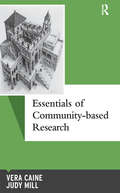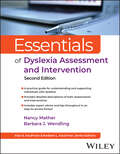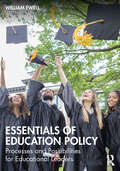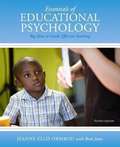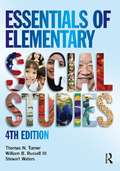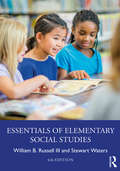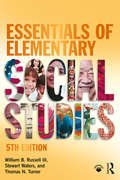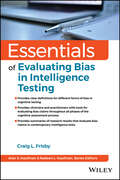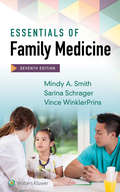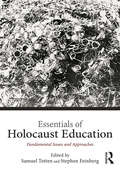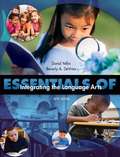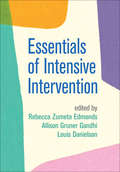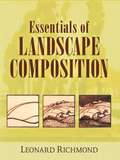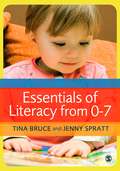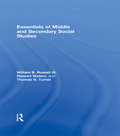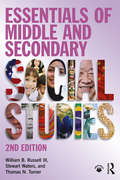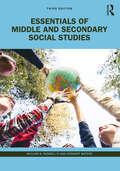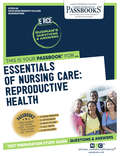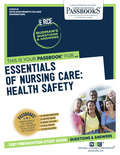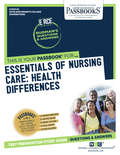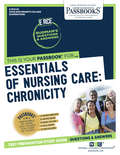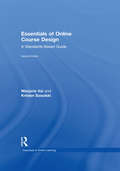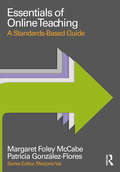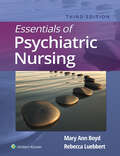- Table View
- List View
Essentials of Community-based Research (Qualitative Essentials #11)
by Vera Caine Judy MillCommunity-based research (CBR) is the most commonly used method for serving community needs and effecting change through authentic, ethical, and meaningful social research. In this brief introduction to CBR, the real-world approach of noted experts Vera Caine and Judy Mill helps novice researchers understand the promise and perils of engaging in this research tradition. This book • outlines the basic steps and issues in the CBR process—from collaboratively designing and conducting the research with community members to building community capacity; • covers how to negotiate complicated questions of researcher control and ethics; • includes a chapter written by community partners, among the examples from numerous projects from around the world.
Essentials of Dyslexia Assessment and Intervention (Essentials of Psychological Assessment #89)
by Nancy Mather Barbara J. WendlingExpert guidance on the features of dyslexia and the most effective treatment options Essentials of Dyslexia Assessment and Intervention allows psychologists, graduate students, reading specialists, and others to quickly acquire the knowledge and skills needed to treat individuals struggling with dyslexia. This book provides step-by-step guidance on accurately identifying, assessing, and using evidence-based interventions with individuals with dyslexia. Addressing the components that need to be considered in the assessment of dyslexia—both cognitive and academic—this book includes descriptions of the various tests used in a comprehensive dyslexia assessment along with detailed, evidence-based interventions that professionals and parents can use to help individuals struggling with dyslexia. A part of the trusted Essentials of Psychological Assessment series, this book features concise chapters designed to facilitate retention of key concepts with callout boxes, bullet points, and extensive illustrations. Additionally, the chapters contain questions to test your knowledge and reinforce what you have learned. This updated second edition covers essential topics for today’s professionals, including genetic factors, reading instruction, technology, and dyslexia in schools. Gain an understanding of the neurological and genetic causes and risk factors of dyslexia Assess reading fluency, phonological awareness, and other markers of dyslexia Discover the latest interventions for improving reading and spelling in individuals with dyslexia Learn to pick up on cues that help with early identification and treatment of dyslexiaProviding an in-depth look at dyslexia, this straightforward book presents information that will prepare school psychologists, neuropsychologists, educational diagnosticians, special education teachers, as well as general education teachers, to recognize, assess, and provide effective treatment programs for dyslexia. The book is also a good resource for parents who are helping a child with dyslexia.
Essentials of Education Policy: Processes and Possibilities for Educational Leaders
by William EwellEssentials of Education Policy improves students’ and educational leaders’ understanding of the complex education policy system in the U.S.Through an applied pedagogical approach that connects analytical concepts from public policy and education research to professional practice, the book offers academic content and applications for elementary, secondary, and postsecondary education leaders. Grounded in pillars of policy studies – educational foundations, governance structures and policy subsystems, the policy process, and specific policy issues – the book provides educational leaders with the knowledge and skills necessary to solve fundamental inequities in American education and empowers them to become change agents.This engaging textbook will be essential reading for students and scholars in Education Policy, Leadership, and Educational Foundations, as well as for educational leaders.
Essentials of Educational Psychology: Big Ideas to Guide Effective Teaching
by Jeanne Ellis OrmrodFocused on the "big ideas" of educational psychology, Essentials of Educational Psychology presents the core concepts and research-based strategies that are most directly applicable to teaching and learning.
Essentials of Elementary Social Studies
by Thomas N. Turner Stewart Waters William B. Russell IIIEssentials of Elementary Social Studies is a teacher friendly text that provides comprehensive treatment of classroom planning, instruction, and strategies. Praised for its dynamic approaches and a writing style that is conversational, personal, and professional, this text enables and encourages teachers to effectively teach elementary social studies using creative and active learning strategies. New to this Edition This fourth edition has been significantly refined with new and relevant topics and strategies needed for effectively teaching elementary social studies. • Keeping with the book’s emphasis on planning and teaching, a full, new chapter on lesson plans has been added. This chapter is designed to provide elementary teachers with 14 classroom tested lessons for each grade level (K-6). • A new chapter on technology is designed to better prepare elementary teachers to effectively teach social studies with technology. Attention is given to digital history, media literacy, teaching with film and music, and numerous other types of impactful technology. • Each chapter now includes a “Resources” section. The resources section provides various resources for further development. The section includes articles, books, and web resources. • Each chapter now includes “Extension” and "Focus" activities. These activities provide readers with the opportunity to extend the learning experience with relevant and meaningful scenarios. Instructors can also use the extension and focus activities as class activities. • Brand new companion website expands on chapter content and provides resources for further study (www.routledge.com/cw/Turner).
Essentials of Elementary Social Studies
by Stewart Waters William B. Russell IIIEssentials of Elementary Social Studies is a teacher friendly text that provides comprehensive treatment of classroom planning, instruction, and strategies. Praised for its dynamic approaches and a writing style that is conversational, personal, and professional, this text enables and encourages teachers to effectively teach elementary social studies using creative and active learning strategies. This sixth edition has been refined with new and relevant topics and strategies needed for effectively teaching elementary social studies. A few of new features include: An expanded chapter on the decision-making process in elementary social studies. This chapter provides additional discussion about the importance of helping young learners better understand the decision-making process and offers strategies for helping teachers make connections between choices, values, character development, and social justice. An updated chapter on technology designed to better prepare elementary teachers to effectively incorporate technology into social studies instruction. Attention is given to virtual teaching and learning, media literacy, teaching with film, and numerous other ways to improve teaching and learning in the digital age. Updated further readings and helpful resources for all chapters to include supplemental digital and video sources related to various topics throughout the chapter. New "Checking for Understanding" section at the end of each chapter that focuses on comprehension, application, and reflection on key concepts throughout the chapters. An updated chapter on lesson plans, in keeping with the book’s emphasis on planning and teaching. This chapter is designed to provide elementary social studies teachers with new classroom-tested lesson plans and includes two classroom-tested lessons for each grade level (K–6).
Essentials of Elementary Social Studies: Elementary Social Studies (Essentials Of Classroom Teaching Ser.)
by Thomas N. Turner Stewart Waters William B. Russell IIIEssentials of Elementary Social Studies is a teacher-friendly text that provides comprehensive treatment of classroom planning, instruction, and strategies. Praised for its dynamic approaches and a writing style that is conversational, personal, and professional, this text enables and encourages teachers to effectively teach elementary social studies using creative and active learning strategies. This fifth edition has been significantly refined with new and relevant topics and strategies needed for effectively teaching elementary social studies. New features include: • In keeping with the book’s emphasis on planning and teaching, an updated chapter on lesson plans. This chapter is designed to provide elementary teachers with new classroom-tested lesson plans and includes two classroom-tested lessons for each grade level (K–6). • An expanded chapter on planning. This provides additional discussion about long-range planning and includes examples of lesson plans with details to help students be better prepared. • An updated chapter on technology designed to better prepare elementary teachers to effectively incorporate technology into social studies instruction. Attention is given to digital history, media literacy, teaching with film and music, popular apps and numerous other types of impactful technology. • An expanded discussion of the Common Core Standards and C3 Framework and how it affects teachers. • An updated chapter titled "Experiencing Social Studies." This chapter focuses on topics such as teaching with drama, role play, field trips, and service learning. • A new eResource containing links to helpful websites and suggestions for further reading.
Essentials of Evaluating Bias in Intelligence Testing (Essentials of Psychological Assessment)
by Craig L. FrisbyThorough overview of the history, viewpoints, and research findings of bias in intelligence testing Essentials of Evaluating Bias in Intelligence Testing delivers a comprehensive overview of potential biases that can come to light when making use of IQ tests across demographics, detailing where bias can work its way into IQ test selection, standardization, content, administration/scoring, and interpretation and providing key foundational knowledge on what IQ test bias is versus what it is not as well as the history of bias claims in recent decades. Research findings are included throughout the book to provide key context. Some of the topics discussed in this book include: The Larry P. v. Wilson Riles trial decision of 1979, which prohibited the use of IQ tests for placing Black students in special education programs, and its carryover to today The heritability of IQ scores, the “nature/nurture” issue, and the role of IQ in the stratification of subpopulation groups in society Implicit assumptions within claims of standardization bias, including that all population subgroups must display equal mean scores and that racial/ethnic groups are internally homogeneous Essentials of Evaluating Bias in Intelligence Testing is an essential read for educators, academics, and administrators seeking to understand the full picture on IQ testing and its validity or lack thereof across different demographics.
Essentials of Family Medicine
by Mindy A. SmithA staple of family medicine training for 30 years, Essentials of Family Medicine offers a comprehensive introduction to this specialty designed just for clerkship students. Covering principles of family medicine, preventive care, and a full range of common ambulatory care problems, it provides all the guidance you need to succeed on a clinical rotation in family medicine.
Essentials of Holocaust Education: Fundamental Issues and Approaches
by Samuel Totten Stephen FeinbergEssentials of Holocaust Education: Fundamental Issues and Approaches is a comprehensive guide for pre- and in-service educators preparing to teach about this watershed event in human history. An original collection of essays by Holocaust scholars, teacher educators, and classroom teachers, it covers a full range of issues relating to Holocaust education, with the goal of helping teachers to help students gain a deep and thorough understanding of why and how the Holocaust was perpetrated. Both conceptual and pragmatic, it delineates key rationales for teaching the Holocaust, provides useful historical background information for teachers, and offers a wide array of practical approaches for teaching about the Holocaust. Various chapters address teaching with film and literature, incorporating the use of primary accounts into a study of the Holocaust, using technology to teach the Holocaust, and gearing the content and instructional approaches and strategies to age-appropriate audiences. A ground-breaking and highly original book, Essentials of Holocaust Education will help teachers engage students in a study of the Holocaust that is compelling, thought-provoking, and reflective
Essentials of Integrating the Language Arts
by David YellinEssentials of Integrating the Language Arts, Fifth Edition, offers students all the practical tools they need to be effective language arts teachers, supported by the necessary theoretical foundation. Like its predecessors, this edition presents a comprehensive approach to teaching the language arts, balancing direct instruction in the communication arts and integrating the language arts with other content areas such as music, art, mathematics, social studies, and science. It explores the important topics of community and caregiver involvement in education and offers thoughtful coverage of diversity in the schools. Practical teaching ideas are found in every chapter.The 5th Edition reflects current teaching practices, field knowledge, and research. Significant changes include: A more streamlined approach to allow readers to move quickly from learning chapter concepts and related theory and research to understanding how they are applied in classroom practices, activities, and strategies Discussion of standards, including the Common Core State Standards (CCSS), with the goal of showing readers how they can apply standards in the classroom to help meet their students' needs New teaching activities that support the chapter topics and align with the CCSS An appendix with more than 25 classroom assessment tools Discussion of current, quality children's and young adult literature, including informational texts, supported by an appendix of annotated lists of books by genre Key Features "In the Classroom" vignettes, describing real teachers implementing language arts strategies and activities with their students "RRP" (Read Research Practice) boxed features, offering ideas for activities and projects "Teaching Activities," which future teachers can use in their own classrooms "Field and Practicum Activities," which readers can use now in field and practicum settings Discussions of technology and websites, to help readers prepare to integrate technology in their own classrooms
Essentials of Intensive Intervention (The Guilford Series on Intensive Instruction)
by Rebecca Zumeta Edmonds Allison Gruner Gandhi Louis DanielsonFew evidence-based resources exist for supporting elementary and secondary students who require intensive intervention--typically Tier 3 within a multi-tiered system of support (MTSS). Filling a gap in the field, this book brings together leading experts to present data-based individualization (DBI), a systematic approach to providing intensive intervention which is applicable to reading, math, and behavior. Key components of the DBI process are explained in detail, including screening, progress monitoring, and the use and ongoing adaptation of validated interventions. The book also addresses ways to ensure successful, sustained implementation and provides application exercises and FAQs. Readers are guided to access and utilize numerous free online DBI resources--tool charts, planning materials, sample activities, downloadable forms, and more.
Essentials of Landscape Composition
by Leonard RichmondAnyone who has mastered the art of writing can learn to draw, according to this accomplished artist and author of several fine art books. Confident that most people have the ability to express themselves artistically once they have acquired the right techniques, Richmond offers his tried-and-true methods of drawing and composition in this easy-to-follow guide."The short road to success" begins with a brush. Richmond advises novices to forego the use of a pencil, since it demands a higher degree of accuracy than the beginner possesses. When a brush is used, the ink glides over the paper easily and is more likely to bring desired results. Starting with simple lines and curves, then moving on to various elements--from clouds and trees to castles and cottages--Richmond offers exercises to train the eyes and hand to work together. In step-by-step pictorial sequences, he effectively illustrates how to construct a successful landscape, offers tips on perspective--and even uses several great works of art for lessons in composition. Invaluable for students and teachers, this guide will help artists at every level bring landscapes to life.
Essentials of Literacy from 0-7: A Whole-Child Approach to Communication, Language and Literacy
by Tina Bruce Jenny SprattChildren flourish in their development and learning when practitioners and parents work together. Childrens′ development and learning are further enhanced when interconnected knowledge and understanding work together. In this new edition the authors guide readers in understanding of child development. They highlight the need for those who work with young children to become reflective practitioners. Through a focus on the introduction of nursery rhymes, finger rhymes, action songs and poetry cards, the authors provide a gentle, child-friendly way to develop literacy 0-7. Thoroughly revised and updated, this book includes: - Case studies and examples - Discussion of the primary framework - Inclusion of schools as an educational setting - Age-appropriate activities - Further reading suggestions at the end of each chapter This book is useful for teachers, practitioners, teaching assistants and childminders and for anyone working with children from birth to seven years in nursery and primary schools, children′s centres, foundation units, and at home. Tina Bruce is an Honorary visiting professor in Early Childhood at Roehampton University. Jenny Spratt is Head of EYFS and Children′s Centre Services for Peterborough Local Authority
Essentials of Middle and Secondary Social Studies
by Thomas N. Turner Stewart Waters William B. Russell IIIBuilding on the success of a much-loved elementary text, Essentials of Middle and Secondary Social Studies focuses on the key issues central to the actual teaching of middle and high school social studies, including lesson planning and inclusive instructional strategies. Written in an engaging, conversational style, the text encourages teachers in their development as professionals and enables them to effectively use creative and active learning strategies in the everyday classroom. Features of the book include: • A full chapter on lesson plans designed to provide middle and secondary social studies teachers with classroom tested lesson plans. The chapter includes two classroom tested lessons for each social science discipline---U.S. History, World History, Geography, Government, Economics, Psychology, & Sociology. • A chapter on technology that is designed to better prepare middle and secondary social studies teachers to effectively teach social studies with technology. Attention is given to digital history, media literacy, teaching with film and music, and numerous other types of impactful technology.• Each teaching methodology and lesson plan discusses how the strategy can be used to meet the individual needs of diverse learners, including English Language Learners and exceptional education students. • A section in each chapter provides various resources for further development. The section includes articles, books, and web resources. • Each chapter includes an “Extension” activity offering readers with the opportunity to extend the learning experience with relevant and meaningful real-life scenarios. • “Focus activities” give readers the opportunity to prepare for the learning experience with relevant and meaningful scenarios. • Covers current topics such as NCSS Standards, Common Core State Standards, Technology, Media, Skills, Character Education, and Literacy.
Essentials of Middle and Secondary Social Studies
by Thomas N. Turner Stewart Waters William B. Russell IIIBuilding on the success of the first edition, Essentials of Middle and Secondary Social Studies 2nd Edition focuses on the key issues central to the teaching of middle and high school social studies, including lesson planning and instructional strategies. Written in an engaging, conversational style, the text encourages teachers in their development as professionals and enables them to effectively use creative and active learning strategies in the everyday classroom. NEW TO THIS EDITION This second edition has been significantly refined with new and relevant topics and strategies needed for effectively teaching middle and secondary social studies. New features include: An updated chapter on lesson plans, in keeping with the book’s emphasis on planning and teaching. This chapter is designed to provide middle and secondary teachers with new classroom-tested lesson plans and includes two classroom-tested lessons for each grade level (6-12). An expanded chapter on planning. This chapter provides additional discussion about long-range planning and includes examples of lesson plans with details to help students be better prepared. An updated chapter on technology designed to better prepare middle and secondary teachers to effectively incorporate technology into social studies instruction. Attention is given to digital history, media literacy, teaching with film and music, popular apps and numerous other types of impactful technology. "FYI" callouts throughout each chapter. These callouts provide helpful information and further explanation. An expanded discussion of the Common Core Standards and C3 Framework and how they impact teachers. An updated chapter titled "Experiencing Social Studies." This chapter focuses on topics such as teaching with drama, role play, field trips, and service learning. A "Helpful Resources" section that details various websites and online resources for further discovery.
Essentials of Middle and Secondary Social Studies
by Stewart Waters William B. Russell IIIBuilding on the success of the previous editions, Essentials of Middle and Secondary Social Studies Third Edition focuses on the key issues central to the teaching of middle and high school social studies, including lesson planning and instructional strategies. Written in an engaging, conversational style, the text encourages teachers in their development as professionals and enables them to effectively use creative and active learning strategies in the everyday classroom. New to This Edition This third edition has been refined with new and relevant topics and strategies needed for effectively teaching middle and high school social studies. New features include: An expanded chapter on the decision-making process in secondary social studies. This chapter provides additional discussion about the importance of helping middle and high school learners better understand the decision-making process and offers strategies for helping teachers make connections between choices, values, character development, and social justice. An updated chapter on technology designed to better prepare secondary social studies teachers to effectively incorporate technology into their instruction. Focus is given to virtual teaching and learning, media literacy, teaching with film, and numerous other ways to improve teaching and learning in the digital age. Updated further readings and helpful resources for all chapters to include supplemental digital and video sources related to various topics throughout the chapter. These resources were specifically curated to be impactful for preservice and in-service teachers, as well as anyone teaching secondary social studies methods courses. Added a "Checking for Understanding" section of questions at the end of each chapter that focuses on comprehension, application, and reflection on key concepts throughout the chapters. An expanded discussion of the Common Core Standards and C3 Framework and how it impacts teachers. An updated chapter titled "Experiencing Social Studies". This chapter focus on topics such as teaching with drama, role play, field trips, and service learning. Each chapter includes a "Helpful Resources" section that details various websites and online resources for further discovery.
Essentials of Nursing Care: Passbooks Study Guide (Excelsior/Regents College Examination Series)
by National Learning CorporationThe Excelsior/Regents College Examinations (E/RCE) offer you an opportunity to obtain recognition for college-level learning and consists of exams designed to demonstrate achievement and mastery of various college-level subjects, such as the Arts and Sciences, Business, Criminal Justice, Education, Health and Nursing. The E/RCE Essentials of Nursing Care: Reproductive Health Passbook® prepares you by sharpening knowledge of the skills and concepts necessary to succeed on the upcoming exam and the college courses that follow. It provides a series of informational texts as well as hundreds of questions and answers in the areas that will likely be covered on your upcoming exam.
Essentials of Nursing Care: Passbooks Study Guide (Excelsior/Regents College Examination Series)
by National Learning CorporationThe Excelsior/Regents College Examinations (E/RCE) offer you an opportunity to obtain recognition for college-level learning and consists of exams designed to demonstrate achievement and mastery of various college-level subjects, such as the Arts and Sciences, Business, Criminal Justice, Education, Health and Nursing. The E/RCE Essentials of Nursing Care: Health Safety Passbook® prepares you by sharpening knowledge of the skills and concepts necessary to succeed on the upcoming exam and the college courses that follow. It provides a series of informational texts as well as hundreds of questions and answers in the areas that will likely be covered on your upcoming exam.
Essentials of Nursing Care: Passbooks Study Guide (Excelsior/Regents College Examination Series)
by National Learning CorporationThe Excelsior/Regents College Examinations (E/RCE) offer you an opportunity to obtain recognition for college-level learning and consists of exams designed to demonstrate achievement and mastery of various college-level subjects, such as the Arts and Sciences, Business, Criminal Justice, Education, Health and Nursing. The E/RCE Essentials of Nursing Care: Health Differences Passbook® prepares you by sharpening knowledge of the skills and concepts necessary to succeed on the upcoming exam and the college courses that follow. It provides a series of informational texts as well as hundreds of questions and answers in the areas that will likely be covered on your upcoming exam.
Essentials of Nursing Care: Passbooks Study Guide (Excelsior/Regents College Examination Series)
by National Learning CorporationThe Excelsior/Regents College Examinations (E/RCE) offer you an opportunity to obtain recognition for college-level learning and consists of exams designed to demonstrate achievement and mastery of various college-level subjects, such as the Arts and Sciences, Business, Criminal Justice, Education, Health and Nursing. The E/RCE Essentials of Nursing Care: Chronicity Passbook® prepares you by sharpening knowledge of the skills and concepts necessary to succeed on the upcoming exam and the college courses that follow. It provides a series of informational texts as well as hundreds of questions and answers in the areas that will likely be covered on your upcoming exam.
Essentials of Online Course Design: A Standards-Based Guide (Essentials of Online Learning)
by Marjorie Vai Kristen SosulskiIn spite of the proliferation of online learning, creating online courses can still evoke a good deal of frustration, negativity, and wariness in those who need to create them. The second edition of Essentials of Online Course Design takes a fresh, thoughtfully designed, step-by-step approach to online course development. At its core is a set of standards that are based on best practices in the field of online learning and teaching. Pedagogical, organizational, and visual design principles are presented and modeled throughout the book, and users will quickly learn from the guide’s hands-on approach. The course design process begins with the elements of a classroom syllabus which, after a series of guided steps, easily evolve into an online course outline. The guide’s key features include: a practical approach informed by theory clean interior design that offers straightforward guidance from page one clear and jargon-free language examples, screenshots, and illustrations to clarify and support the text a checklist of online course design standards that readers can use to self-evaluate. a Companion Website with examples, adaptable templates, interactive learning features, and online resources: http://essentialsofonlinecoursedesign.com Essentials of Online Course Design serves as a best practice model for designing online courses. After reading this book, readers will find that preparing for online teaching is a satisfying and engaging experience. The core issue is simply good design: pedagogical, organizational, and visual. For more of Marjorie Vai in her own words, listen to this 2011 interview from the On Teaching Online podcast: http://onteachingonline.com/oto-16-essentials-of-online-course-design-with-marjorie-vai/
Essentials of Online Teaching: A Standards-Based Guide (Essentials of Online Learning)
by Margaret Foley McCabe Patricia González-FloresTeachers’ active online participation and engagement with students are critical factors to the success of online courses. Essentials of Online Teaching is a standards-based, straightforward guide to teaching online in higher education, high school and vocational training, or corporate learning environments. This brief but powerful book encourages immediate application of concepts with the help of real-world examples, technical insights, and professional advice. The guide includes: a practical approach informed by, but not about, relevant learning theories; clear models and examples from a wide variety of online courses; teachers’ reflections about their online practice; a checklist of standards to help guide teaching decisions; and an accompanying website (www.essentialsofonlineteaching.com) with additional resources. Essentials of Online Teaching addresses key instructional challenges in online teaching and presents the reader with practical solutions for each phase of a course—preparation, beginning, middle, and end.
Essentials of Psychiatric Nursing
by Mary Ann Boyd Rebecca LuebbertHelp beginning nursing students gain the basic knowledge, therapeutic communication capabilities, and patient interaction skills to confidently prepare for psychiatric nursing practice. Easy to use and backed by the latest clinical evidence, Essentials of Psychiatric Nursing, 3rd Edition, is rich with clinical examples and explanations that help clarify challenging concepts and equip students for success as entry-level nurses. Whether used in dedicated psychiatric nursing courses or for integrating psychiatric nursing principles into an existing course, this engaging text establishes the fundamental understanding students need to effectively care for individuals with emotional and mental health problems in any healthcare setting. New and Updated Features NEW! Content helps students recognize and address the effects of COVID-19 on mental health and embrace changes in the practice and delivery of mental health nursing, such as virtual therapy. UPDATED! Coverage of veteran care empowers students to confidently manage specific mental health issues affecting military veterans and their families. UPDATED! Community nursing care coverage helps students make a confident transition to practice outside of traditional hospital settings, increasing their career prospects.
Essentials of Psychology: Concepts and Applications (Fourth Edition)
by Jeffrey S. NevidThe new edition of this brief introductory text retains the hallmark features that have made its parent text unique, while offering a more manageable, student-friendly format. The book was written with three goals in mind: to make the study of psychology accessible and engaging to the beginning student in psychology, to provide students with a solid grounding in the knowledge base in psychology, and to help students succeed in the course. Nevid’s comprehensive learning system-derived from research on memory, learning, and textbook pedagogy-is featured throughout. This learning model incorporates what the author calls the Four E’s of Effective Learning-Engaging Student Interest, Encoding Information, Elaborating Meaning, and Evaluating Progress. ESSENTIALS OF PSYCHOLOGY: CONCEPTS AND APPLICATIONS, 4th Edition, provides a broad view of psychology as well as applications of the knowledge gained from contemporary research to the problems and challenges we face in today’s world.
